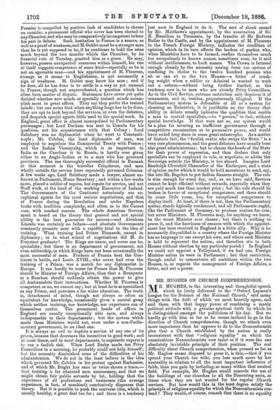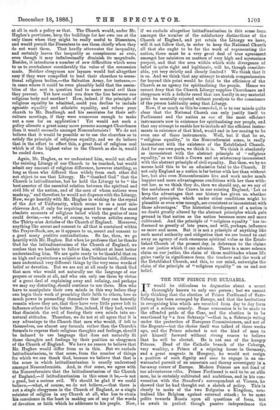MR. HUGHES ON CHURCH COMPREHENSION.
MR. HUGHES, in the interesting and thoughtful speech which he lately delivered to the "Oxford Laymen's League for the Defence of the National Church," said many things with the drift of which we most heartily agree, and said them with that happy power of combining a manly political attitude with a genuine spiritual faith by which he is distinguished amongst the politicians of his day. But we hardly go with him as far as he seems inclined to go in the direction of Church comprehension, though we attach even more importance than he appears to do to the Nonconformist plea that a Church established by the nation is really inconsistent with that "religious equality" on which the conscientious Nonconformists now insist as if it were the one absolutely inviolable principle of their position. The real difficulty about Church comprehension, when pressed so far as Mr. Hughes seems disposed to press it, is this' —that if you spread your Church too wide, you lose much more by her neutrality in relation to all the most important influences of faith, than you gain by including so many within that neutral field. For example, Mr. Hughes would concede the use of the buildings of our churches to all the Dissenting sects, at times when they are not wanted for the regular Church services. Bat how would this in the least degree satisfy the principle of religions equality for which the Nonconformists con- tend They would, of coarse, remark that there is no equality at all in such a policy as that. The Church would, under Mr. Hughes's provisions, keep the buildings for her own use at the only times when they might be really useful to Dissenters, and would permit the Dissenters to use them chiefly when they do not want them. That hardly attenuates the inequality, and certainly leaves the inequality as conspicuous as ever, even though it may infinitesimally diminish its magnitude. Besides, it introduces a number of new difficulties which seem to us to overbalance considerably the value of the concession made. Neither clergymen nor laymen would feel altogether easy if they were compelled to lend their churches to sensa- tional religious bodies,—the Salvation Army, for instance,— in cases where it could be even plausibly held that the assem- blies of the sect in question lead to more moral evil than they prevent. Yet how could you draw the line between one religious body and another? How, indeed, if the principle of religious equality be admitted, could you decline to include agnostic equality and atheistic equality, and refuse your church to Mr. Bradlaugh and his associates for their self- culture meetings, if they were numerous enough to make out a case for an application ? Yet would not such a policy alienate a great many more persons amongst Churchmen than it would reconcile amongst Nonconformists? We do not believe that it would be possible so to use the churches as to satisfy the principle of religious equality, and we do believe that in the effort to effect this, a great deal of religious zeal which is of the highest value to the Church as she is, would be cooled down.
Again, Mr. Hughes, as we understand him, would not allow the existing Liturgy of our Church to be touched, but would admit any amount of religious difference, however startling, so long as those who differed thus widely from each other did not object to use that Liturgy. He "thanked God" that the Church is latitudinarian, but he held the Liturgy to be " the best asserter of the essential relation between the spiritual and civil life of the nation, and of the men of whom nations were made up," and therefore he would not dispense with the Liturgy. Now, we go heartily with Mr. Hughes in wishing for the repeal of the Act of Uniformity, which seems to us a most mis- chievous Act, if only for requiring assent to some of the most obsolete accounts of religious belief which the genius of man could devise,—we refer, of course, to various articles among the Thirty-nine Articles of the Church of England. Moreover, anything like assent and consent to all that is contained within the Prayer-Book, are, as it appears to us, assent and consent to a good many positive contradictions. So far, then, we go heartily with Mr. Hughes. But when he professes that he thanks God for the latitudinarianism of the Church of England, we confess that we hesitate to follow him, without at least better understanding him. We are quite ready to be thankful that on so high and mysterious a subject as the Christian faith, different men understand very different things by the very same words of belief or devotion. But we are not at all ready to thank God that men who would not naturally use the language of our prayers or creeds at all, and who can only use them by virtue of a great deal of explaining away and refining, and perhaps we may say distorting, should continue to we them. Men who have to manipulate their own minds in this way before they can begin their work of preaching their faith to others, lose so much power in persuading themselves that they can honestly remain where they are, that they have very little power left to influence others for the better. Nor, indeed, if they had, would that diminish the evil of forcing their own minds into un- natural attitudes. Therefore, we do not at all agree that it is any advantage to the Church that men who would, if left to themselves, use almost any formula rather than the Church's formula to express their religious thoughts and feelings, should be induced to use language that does not naturally fit those thoughts and feelings by their position as clergymen of the Church of England. We have no reason to believe that Mr. Hughes would differ from us in this. But we exclude latitudinarianism, in that sense, from the number of things for which we can thank God, because we believe that that is the sense in which latitudinarianism is usually understood amongst Nonconformists. And, in that sense, we agree with the Nonconformists that the latitudinarianism of the Church of England,—if latitudinarianism in this sense it be,—is not a good, but a serious evil. We should be glad if we could believe,—what, of course, we do not believe,—that there is not a single clergyman in the Church of England, or a single minister of religion in any Church at all, who has to strain his conscience in the least in making use of any of the words of devotion or faith which he addresses to his people. Now, if we exclude altogether latitudinarianism in this sense from amongst the number of the satisfactory distinctions of the Church of England, and yet retain the Liturgy we have, will it not follow that, in order to keep the National Church all that she ought to be for the work of regenerating the nation, there must be a very great deal of true agreement amongst her ministers on matters of very high and mysterious purport, and that the area within which wide divergence of belief is quite right and legitimate, will be, though consider- able, yet very strictly and clearly limited ? We think that it is so. And we think that any attempt to stretch comprehension far beyond this point would be fatal to the efficiency of the Church as an agency for spiritualising the people. Hence we cannot deny that the Church Liturgy supplies Churchmen and clergymen with a definite creed that can hardly in any material point be mentally rejected without paralysis to the conscience of the person habitually using that Liturgy.
Now, if as much as this be conceded, it is to our minds quite clear that the National Church can only justify itself to Parliament and the nation as one of the most efficient instruments now in existence for spiritua,lising our people, and that any attempt to enable her to include all the efficient instru- ments in existence of that kind, would end in her ceasing- to ha even one of those instruments. Well, but if that be so, "religious equality," in the Nonconformist sense, is really inconsistent with the existence of the Established Church. And for our own parts, we think it is. We think it absolutely as inconsistent with the abstract principle of "religious equality," as we think a Crown and an aristocracy inconsistent with the abstract principle of civil equality. But then, we by no means hold this to be an admission fatal to the Church. If not only England as a nation is far better with her than without her, but also even Nonconformists live and work under math happier and more advantageous conditions with her than with- out her, as we think they do, then we should say, as we say of the usefulness of the Crown in our existing England, Let us keep the advantages that our history has given us, whether abstract principles, which under other conditions might be plausible or even wise enough, are consistent or inconsistent with those advantages.' The historical development of a. nation is no doubt greatly altered by the abstract principles which gain ground in that nation as the nation becomes more and more cultivated. And the principle of "religious equality" has in- fluenced us greatly of late years, and will, perhaps, influence us more and more. But it is not a principle of anything like such moral authority and obligation that we are bound to cast away an agency of such enormous spiritual value as the Estab- lished Church of the present day, in deference to the claims on our justice which it can advance. There is a more solemn claim on our justice, the claim of those multitudes whose life gains vastly in significance from the teachers and the work of the Established Church, and this, to our mind, outweighs the - claim of the principle of "religious equality" on us and our belief.











































 Previous page
Previous page